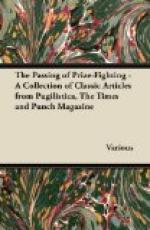* * * * *
FURTHER REMINISCENCES.
(WITH ACKNOWLEDGMENTS TO MR. GEORGE R. SIMS).
We come now to the beginning of the sixties. I well remember, early in the summer of one of them, Gentleman Dick—we called him this because his father had been a tramp, and, although he scarcely justified the maternal strain (his mother had been a washerwoman), he was certainly to all appearances his father’s son—rushing in to tell me that “Blue Satin,” the prize bull bitch belonging to the proprietor of that well-known tavern—public-houses were scarcely known in those days—“The Seven Sisters,” had given birth to a son.
This was an opportunity too good to be missed, and in spite of the bitter cold I hurried off with Gentleman Dick, who already had acquired no small reputation for his dexterity in hanging on to the backs of cabs, and ultimately secured “Albert the Good.” If I had to christen a pup now I should naturally call him “Jellicoe the Brave.” “Albert the Good” scarcely lived up to his name and eventually I had to get rid of him. He bit a piece out of a constable’s leg. Sir J—— B——, the presiding magistrate at Bow Street, was most charming about it however, and gave me a seat on the bench during the constable’s evidence.
I remember it especially because it was the day following this I was in at the death, when Ebenezer Smith, the Mayfair murderer, came to his end. He made an excellent breakfast of ham and eggs just before his execution, the Governor was good enough to tell me, and was collected enough even to grumble at the age of one of the eggs.
D—— L——, the famous comedian, was very funny always about his eggs. I remember he had an idea that if you whistled to the hen before the egg was laid the result tasted better when you ate it. He wanted me to write a comic song for him on these lines, but the idea never came to anything. I was very busy at the time collecting royalties. The thousandth performance of The Merry Murderers had just taken place, and at last I felt free to shake the dust of the City from my feet and devote myself to literature.
It was just about this time that Jim Peters became the idol of England through knocking out the Black Bully—a coloured bruiser with an immense capacity for eating beef—in a couple of rounds. Peters was one of the best of fellows when he wasn’t drunk, and could wink one eye in a manner I have never seen equalled by that later idol of the British public, M—— L——.
Alas! poor Peters from fat purses fell to thin times. He petered out, in fact, as far as the Mile End workhouse, where I discovered him one sad day, and was ultimately able to get him married to the lady who sold winkles on the pavement just outside. Her previous pitch had been just outside the Hoxton Theatre, but she told me she found Mile End more disposed to her wares. The marriage turned out a very happy one, I am glad to say, and it pleased me to think that Jim, having had his wink, was at least sure of his winkle.




